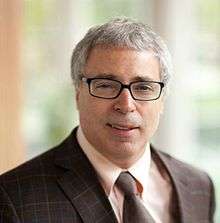Nir Barzilai
| Nir Barzilai | |
|---|---|
 | |
| Born | Haifa, Palestine |
| Residence | New York City, NY, USA |
| Citizenship | United States of American and Israel |
| Fields | genetics and biology of aging, endocrinology/diabetes |
| Institutions | Albert Einstein College of Medicine |
| Alma mater | Technion-Israel Institute of Technology |
| Known for | biology of aging, genetics of exceptional longevity |
| Notable awards | Irving S. Wright Award of Distinction in Aging Research Award (September 2010) |
Dr. Nir Barzilai is the founding director of the Institute for Aging Research,[1] the Nathan Shock Center of Excellence in the Basic Biology of Aging and the Paul F. Glenn Center for the Biology of Human Aging Research at Albert Einstein College of Medicine of Yeshiva University (Einstein). He also directs the Longevity Genes Project,[2] a genetics study of over 600 families of centenarians and their children. The participants are all Ashkenazi Jews, a group selected for their genetic heterogeneity, which makes it easier to identify significant genetic variations. Dr. Barzilai found that many of the centenarians had very high levels of HDL, or the “good cholesterol." [3] Dr. Barzilai is also co-founder of CohBar, Inc., a biotechnology company developing mitochondria based therapeutics to treat diseases associated with aging.
Dr. Barzilai discovered several “longevity genes” in humans that were validated by others.[4] These include variants in genes involved in cholesterol metabolism (CETP[5] and APOC3[6] ), metabolism (ADIPOQ[7] and TSHR[8]) and growth (IGF1R[9]). These genes appear to protect centenarians against major age-related diseases, such as cardiovascular disease, cancer, type 2 diabetes and dementia.[10]
Treatments for age-related diseases are being developed based on Dr. Barzilai’s work and are currently in clinical trials with Anacetrapib. The diabetes research is led by CohBar Inc.,[11] a biotech company that Dr. Barzilai helped co-found. In addition to his “longevity gene” research, Dr. Barzilai studies key mechanisms involved in the biology of aging, including how nutrients[12] and genetics[13] influence lifespan. He is also investigating how mental decline and personality affect longevity.[14] At Einstein, Dr. Barzilai is also professor of medicine (endocrinology) and of genetics, and holds the Ingeborg and Ira Leon Rennert Chair in Aging.
Dr. Barzilai was born in Palestine and received his M.D. from Technion-Palestine Institute of Technology in Haifa, Israel. He was chief medic in the army from 1977 to 1985. He first came to the U.S. in 1987 as a resident at Yale University. He joined Einstein in 1993 as instructor of medicine (endocrinology).[15]
He currently lives in Westchester, NY with his wife. They have two children.
References
- ↑ "Institute for Aging Research". Albert Einstein College of Medicine. Archived from the original on October 29, 2010. Retrieved April 29, 2014.
- ↑ Dreifus, Claudia (February 24, 2004). "A CONVERSATION WITH/Nir Barzilai; It's Not the Yogurt: Looking for Longevity Genes". New York Times. New York, NY. Retrieved April 29, 2014.
- ↑ deGrasse Tyson, Neil (host); Cohen, Chad (correspondent) (Jan 2007). "Aging". NOVA scienceNOW. PBS.
- ↑ Green, Jesse (November 6, 2011). "What Do a Bunch of Old Jews Know About Living Forever?". New York (magazine). NY, NY. Retrieved April 30, 2013.
- ↑ Barzilai, N; Atzmon, G; Schechter, C; Schaefer, EJ; Cupples, AL; Lipton, R; Cheng, S; Shuldiner, AR (October 15, 2003). "Unique lipoprotein phenotype and genotype associated with exceptional longevity". JAMA. American Medical Association. 290 (15): 2030–2040. doi:10.1001/jama.290.15.2030. PMID 14559957. Retrieved April 29, 2014.
- ↑ Atzmon, G; Rincon, M; Schechter, C; Shuldiner, An; Lipton, R; Bergman, A; Barzilai, N (April 4, 2006). "Lipoprotein Genotype and Conserved Pathway for Exceptional Longevity in Humans". PLoS Biol. 4 (4): e113. doi:10.1371/journal.pbio.0040113. Retrieved April 30, 2014.

- ↑ Atzmon, G; Polin, TI; Crandall, J; Tanner, K; Schechter, CB; Scherer, PE; Rincon, M; Siegel, G; Katz, M; Lipton, RB; Shuldiner, AR; Barzilai, N (2008). "Adiponectin levels and genotype: A potential regulator of life-span in humans". Journal of Gerontology: Biological Sciences. Oxford University Press/The Gerontological Society of America. 63 (5): 447–453. doi:10.1093/gerona/63.5.447. Retrieved April 30, 2014.
- ↑ Atzmon, G; Barzilai, N; Hollowell, JG; Surks, MI; Gabriely, I (October 16, 2009). "Genetic Predisposition to Elevated Serum Thyrotropin is Associated with Exceptional Longevity". The Journal of Clinical Endocrinology & Metablism. The Endocrine Society. 94 (12): 4768–4775. doi:10.1210/jc.2009-0808. PMC 2795660
 . PMID 19837933. Retrieved April 30, 2014.
. PMID 19837933. Retrieved April 30, 2014.
- ↑ Suh, Y; Atzmon, G; Cho, M-O; Hwang, D; Liu, B; Leahy, D; Barzilai, N; Cohen, P (March 4, 2008). "Functionally-significant insulin-like growth factor-I receptor mutations in centenarian". PNAS. National Academy of Sciences. 105 (9): 3438–3442. doi:10.1073/pnas.0705467105. PMC 2265137
 . PMID 18316725. Retrieved April 30, 2014.
. PMID 18316725. Retrieved April 30, 2014.
- ↑ Carey, Benedict (May 21, 2009). "At the Bridge Table, Clues to a Lucid Old Age". The New York Times. Retrieved April 30, 2014.
- ↑ P. Cohen Eureka Grant (2013-03-06). "CohBar, Inc: Innovations in the Treatment of Age-Related Diseases". Cohbar.com. Retrieved 2014-04-24.
- ↑ Barzilai, N; Huffman, DM; Muzumdar, RH; Bartke, A (June 2012). "The critical role of metabolic pathways in aging". Diabetes. American Diabetes Association. 61 (6): 1315–1322. doi:10.2337/db11-1300. Retrieved April 30, 2014.
- ↑ Barzilai, N; Guarente, L; Kirkwood, TB; Patridge, L; Rando, TA; Slagboom, PE (July 10, 2012). "The place of genetics in ageing research". Nature Reviews Genetics. Nature. 13 (8): 589–594. doi:10.1038/nrg3290. Retrieved April 30, 2014.
- ↑ Kato, K; Zweig, R; Schechter, C; Verghese, J; Barzilai, N; Atzmon, G (March 23, 2013). "Personality, self-rated health, and cognition in centenarians: Do personality and self-rated health relate to cognitive function in advanced age?". Aging. Impact Journals. 5 (3): 183–191. doi:10.18632/aging.100545. PMC 3629290
 . PMID 23524310.
. PMID 23524310.
- ↑ "Nir Barzilai CV" (PDF). Albert Einstein College of Medicine. Mar 31, 2012. Retrieved April 30, 2014.